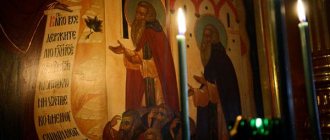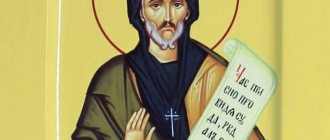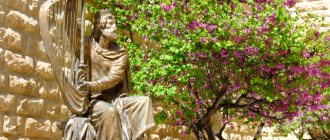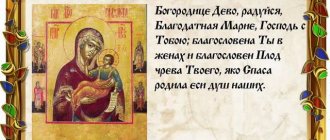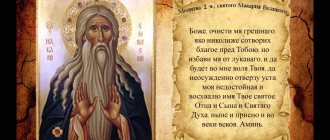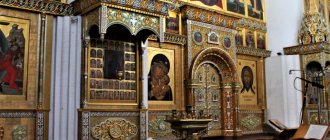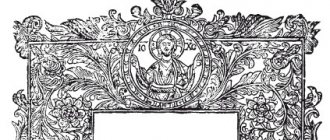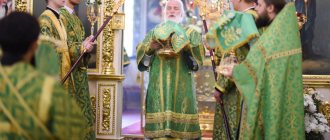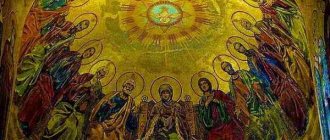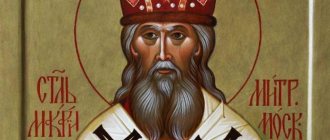Lord and Master of my life, do not give me the spirit of idleness, despondency, covetousness and idle talk. Grant the spirit of chastity, humility, patience and love to Thy servant. To her, Lord, King, grant me to see my sins and not condemn my brother, for blessed are you forever and ever. Amen!
Listen to the prayer (read by Patriarch Kirill):
Church worship is subject to the canons. According to them, the prayer of Ephraim the Syrian is read once a year - during Great Lent (most of all). There are no barriers to turning to repentance at home: pray as you wish. If you feel the benefit - at any time. Following the monastic rules, it is recommended: to include in cell prayer in the morning and evening. It is added to the regular Rule from the moment it begins to be read in the temple.
In what cases is the prayer of Ephraim the Syrian read?
The prayer of Ephraim the Syrian is a prayer of repentance. It lists the sins that prevent us from repenting, and the virtues that help with this.
Spirit of idleness : laziness, spending time carelessly. Every person has God-given talents and knowledge that must be used for the benefit of people and for the glory of God. Idleness is the root of all sins because it relaxes the body and soul.
Dejection is the fruit of idleness, when a person himself cannot do something good, and is not able to pray to God for help.
Lust for power is the love of power: in the family, in a group of colleagues, in politics. Often it is idleness, laziness and despondency that fill our lives with lust. Laziness and despondency distort our attitude towards life, deprive it of meaning, and, as if compensating for this, a thirst for power is born in us.
Idle talk : empty, swear words, angry talk, leading to condemnation and insults.
Chastity : spiritual control over one's emotions and over one's body. Moral purity in deeds, words and thoughts.
Humility is the first fruit of chastity. The more the soul is purified, the less proud it is of itself, because it sees that there is nothing to be proud of. A person stops considering himself better than others.
Patience : sin makes a person impatient, quick to judge and condemn others. Patience brings the ability to wait and hope.
Spirit of Love : Love is the main gift and the main goal of all our spiritual works. It is love that changes our attitude towards our neighbor from condemnation to forgiveness and mercy. Only through love, which comes to a softened and purified heart, does a person approach God - and this is the main goal of Great Lent.
About paradise
St. Ephraim the Syrian (IV century) is one of the great ascetics of the Church. Having acquired humility, meekness, and submission to God's Providence, he became for many a teacher of repentance, faith and piety. In his ascetic life, the Monk Ephraim devoted a lot of time to the study of the Holy Scriptures, drawing from it tenderness and wisdom for his soul.
A small work by the Monk Ephraim is a hymn-reflection on the paradise from which Adam and Eve were expelled - about the spiritual paradise, as a heavenly fatherland for every Christian.
- Author: Venerable Ephraim the Syrian
- Performer: Andrey Kabilov
- The year of publishing: 2018
Original text of the prayer
In Old Church Slavonic:
Lord and Master of my life, do not give me the spirit of idleness, despondency, covetousness and idle talk. Grant the spirit of chastity, humility, patience and love to Thy servant. To her, Lord, King, grant me to see my sins and not condemn my brother, for blessed are you forever and ever. Amen.
In modern Russian:
Lord and Master of my life! Do not give me a tendency towards laziness, carelessness, lust for power and idle talk. Send purity of soul, humility, patience and love to me, Thy servant. Yes, King Lord, let me see my own sins and not condemn my brother; for blessed are You forever and ever. Amen.
Why is this prayer said only during fasting?
Become a courier of the Yandex.Food service right now (up to 3,400 rubles per shift) leave a request →
A person should pay attention every day to what he does, how he lives his life. But it is during the period of fasting that you need to concentrate, identify your sins and do everything possible to correct your shortcomings.
During the period of fasting, a person must make even more efforts than usual to transform his life for the better. But, to achieve this goal, God’s assistance is necessary; this is why people read this prayer.
Prayer of Ephraim the Syrian in other languages
In Ukrainian:
Lord and Master of my life, the spirit of laziness, hopelessness, love of power and marnoslavism, do not give me. Grant me the spirit of integrity, humble wisdom, patience and love, Thy servant. So, Lord the King, grant me to forgive my faults and not to judge my brother, for blessed are You forever. Amen.
In Polish:
Panie i Władko żywota mego! Nie dawaj mi ducha próżniactwa, zniechęcenia, chciwości, panowania i gadatliwości, Za to obdarz mnie, Twego sługę, duchem wstydliwości, skromności, cierpliwości i miłości, O, Panie i Królu! Spraw, abym widział moje przewinienia I nie potępiał brata mego. Albowiem Tyś łogosławiony jest na wieki wieków. Amen.
How to read a prayer correctly
Ephraim the Syrian's prayer of repentance is so important that in church it is read by a priest (and not a deacon or reader). Standing facing the Royal Doors, the priest loudly pronounces three petitions, accompanying each with a bow to the ground.
Rising after the third bow, the priest makes twelve bows from the waist, each with the words “God, cleanse me, a sinner.”
At the end of them, the priest says the prayer in full and makes another bow to the ground. Following the priest, all those praying in the temple bow. At home, the prayer of Ephraim the Syrian is read aloud, bowing in the same way.
While reading the prayer independently, it is also necessary to bow to the ground:
Lord and Master of my life! Do not give me the spirit of idleness, despondency, covetousness and idle talk.
(bow to the ground)
Grant the spirit of chastity, humility, patience and love to Thy servant.
(bow to the ground)
To her, Lord the King, grant me to see my sins and not condemn my brother, for blessed are you forever and ever. Amen.
(bow to the ground)
God, cleanse me, a sinner.
(12 times with bows from the waist)
And once again the entire prayer with one bow to the ground at the end.
Why is this prayer needed?
Work as a courier at Yandex.Eda (up to 3,400 rubles per shift) leave a request →
Sometimes people do not understand why this, at first glance, simple and small prayer occupies such a high place in worship during Lent. The answer is quite simple; in the prayer of St. Ephraim the Syrian, all the positive as well as negative elements of repentance were collected. Also, reading this prayer, a person determines for himself a list of deeds.
The main goal of exploits is to free a person from any illness that interferes with normal life and prevents him from embarking on the path of turning to God. The most common illness is considered to be: laziness, idleness, negligence.
These negative qualities have a bad effect on a person, they pull him down, thereby not only moving away from God, but laziness and negligence constantly prevent a person from changing something in his life in a positive direction. When the prayer of Ephraim the Syrian is read, parishioners ask the Lord for forgiveness for all the sins they have committed.
Another strong illness is despondency. Many spiritual teachers consider this problem to be the main danger to the human soul. When a person is in this unfavorable state, he loses the ability to adequately assess the situation and see something good, everything comes down to negativity.
Most believers are of the general opinion that in this case the devil begins to control a person, because he is a liar who presents a person with incorrect information about God and the whole world as a whole, filling his entire world with darkness. Reading the prayer of Ephraim the Syrian, people ask that such a state never come to them, and that they can fully experience all the colors of life.
The last disease is covetousness - this is excessive love of power. Lustful behavior arises in a person due to the presence of the two ailments described above, which distort a person’s understanding. Through power, he desires retribution in relation to other people, trying to subjugate them to himself.
So many bows are made to Pochepu
After each request of the prayer of Ephraim the Syrian, a prostration is made. For what? Man fell away from God soul and body; both soul and body must be restored to return to God. Salvation and repentance are not the contempt of the body, as is sometimes claimed, but its restoration.
After all, we will be resurrected in a body, only a new one. Christian asceticism is a struggle not against the body, but for it. Therefore, the whole person - soul and body - repents. The body participates in the prayer of the soul in the same way that the soul prays not outside, but in its body.
Church Slavonic text, read at home
The version of the prayer in Old Slavic also brings good results. However, in this case, the likelihood of deep penetration and search for meaning is reduced. Without understanding prayer, it will be difficult to be imbued with sincerity.
It is necessary to read the version of the text with accents. If the prayer is difficult to come by, you should return to reading it in Russian. Moreover, it is possible to read the text online. You can print it for your own convenience. Before downloading, you need to select the path where the file will be saved on your PC so that you can easily find it.
Send this prayer to your loved ones
Send this prayer to your loved ones
Inspiring story: who is Ephraim the Syrian
All Orthodox Christians know St. Ephraim the Syrian as an outstanding ascetic and one of the most authoritative interpreters of the Holy Scriptures in the Church. His contemporaries called him nothing less than the Prophet of Syria. However, the saint’s life did not immediately take a straight path.
In his youth, he had a very ardent disposition and was sometimes on the verge of actual crime. The reason for this was later cited by the monk as his then disbelief in the good Providence of God, which governs all events in the world. The conviction that everything in life happens by chance almost destroyed the future ascetic, but the Lord showed him the action of His Providence, albeit in a very unusual way.
One day Ephraim went on a journey, although it would be more accurate to say - to wander, because he did not have any specific goal. On the way, he spent the night in a field with a hospitable shepherd, with whom he drank wine and fell asleep. At night, wolves attacked the herd and dragged away the sheep. The next morning, the owners of the herd accused the newcomer of stealing cattle and dragged him to the judge.
Appearing before the judge, Ephraim tried to explain how everything really happened. Following him, a man was brought to court, caught in adultery with one woman, who ran away and hid. The judge, postponing the investigation of the case, sent both defendants to prison. There, along with them, was also a peasant who had been arrested for murder. But just as Ephraim was not a sheep stealer, so he who was brought with Ephraim was not an adulterer, nor was the farmer a murderer.
On the eighth day of his arrest, someone appeared to Ephraim in a dream and said: “Be pious, and you will understand Providence. Go over in your thoughts what you thought about and what you did in your life. Then, by your own example, you will be convinced that the people arrested with you are not suffering unjustly, although they are innocent of the crimes they are accused of.”
Having awakened, Ephraim began to reflect on the vision and look for his misdeeds in his memory. Suddenly he remembered that, having been in the same village before, out of empty mischief, he drove one poor man’s cow out of the pen and into the field in the middle of the night. She was pregnant and weak from the cold. In the field, an animal overtook her and tore her to pieces.
Shocked by the picture of God's Providence that revealed itself to him, Ephraim immediately told the rest of the prisoners about his dream and forgotten guilt. The story made a strong impression on them, and they also began to remember: a peasant saw a man drowning in the river, and although he could have helped him, he did not; and a city resident joined the accusers of one slandered woman, a widow; Her brothers, accusing her of adultery, deprived her of her father's inheritance, giving him a portion of the judgment for perjury in court.
The Monk Ephraim describes his impressions from this confession of his comrades in misfortune:
At these stories I began to feel contrite; because there was some obvious reward in it. And if I were alone, I would say, perhaps, that all this happened to me simply as a human being. But the three of us are subject to the same participation. ...As I fell asleep the next time, I saw that the same one was telling me: “Tomorrow you will see those for whom you are offended, and liberation from the slander brought against you.
Then it turned out that the true perpetrators of the crimes for which Ephraim’s neighbors were languishing in prison were “accidentally” brought to court in completely different cases. During the trial, the judge found out the truth, revealing their previously hidden guilt. In addition to this, on the eve of the hearing of Ephraim’s case, a new judge was also “accidentally” appointed to the position, who “accidentally” turned out to be from the place where young Ephraim had gone to wander.
Moreover, this new judge “by chance” turned out to be a good friend of Ephraim’s parents, visited their house and remembered him as a child. This story ended with the innocent being released from prison and the guilty being punished. And Ephraim himself, after almost seventy days in prison for the rest of his life, believed that there are no accidents in life, and every sin committed has its own reward. Thus began the life of the one who is now known to all Orthodox Christians of the world as St. Ephraim of Nizib, the Syrian prophet.
The path to a new life is repentance
Ephraim the Syrian is a Christian poet and also a theologian. In part, these abilities allowed him to write truly the most effective prayer of repentance, thanks to which it acquired the appropriate name - repentance. In addition, the text is read during Lent. This is where another name came from - Lenten.
Ephraim was canonized after his death
acquired the status of Reverend.
According to the new calendar style, his memory is celebrated on January 28 (in Orthodoxy). Since then it has been the day of St. Ephraim the Syrian. He was born to pious people. However, it cannot be said that the young man kept the commandments in his youth. On the contrary, Ephraim committed unseemly acts, which is why one day he heard a voice that asked how many offenses he had caused people, how heavy this burden was for them and for himself. This helped me reevaluate my actions and thoughts.
Ephraim became a hermit and repented of his sins throughout his life. The word “repentance” literally means “a change of mind and properties of the soul.” Accordingly, a layman who repents of his sins, prays for forgiveness, brings the Kingdom of God closer and will himself get there. Repentance is preceded by a descending understanding of the depth of one’s own guilt before another person, sin. This also creates a feeling of remorse. If you sincerely ask for forgiveness from the Lord, your sins will be forgiven.
After this, your lifestyle changes
thoughts, awareness appears in thoughts and actions.
A person no longer acts without thinking, but evaluates the risks of committing wrong actions for himself and others, does not live in sin, since he avoids temptations and can resist them. Ephraim also repented. Until the end of his days he performed pious deeds. He chose his own path - he was engaged in writing essays, which were later read in churches, some of which became part of the liturgical use of prayers. Ephraim also wrote poems that were later used against heresy.
Despite the high level of knowledge, Sirin Efim called himself “unlearned, weak-minded.” In fact, many of the wisest of his time admired how smart he was. The monk was engaged in translations and knew the Psalter. He also offered an interpretation of the Holy Scriptures (Psalms). However, Ephraim's creations have reached the modern world only partially. He wrote more than 1,000 works and essays, and about a quarter of this amount was published.
Moreover, many of the works that the Slavic tradition attributes to Sirin
are not authentic.
Contemporaries called Sirin the Syrian Prophet. Ephraim wrote not only essays, but also expressed his thoughts and feelings about the future and present. He was considered a true speaker of the Christian word. Moreover, he did not use artificial verbal structures in his speeches. The creations of Ephraim were devoid of idle talk.
In his sermons, Ephraim spoke about the approach of the Last Judgment, repentance (first of all), advised parents and paid due attention to the upbringing of children. Moreover, Saint Ephraim read sermons, but at the same time they were devoid of gloom. By the way, the Reverend himself always said that despondency is a sin. If the reader has children, he should ask for them as well.
Even when a person experiences mental anguish for the sins he has committed, he should not humiliate himself.
Dejection is a state in which a self-destruction program can be activated,
and after that comes physical death.
Special details of the Saint’s life can be found on the Optina Pustyn website.
